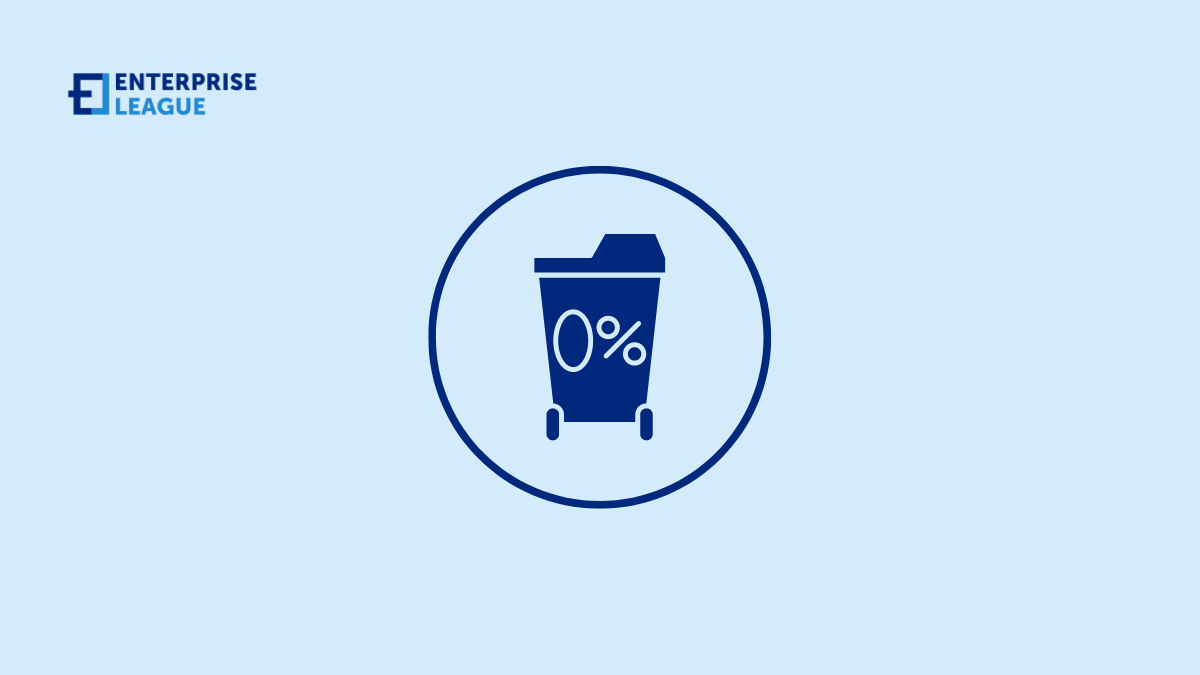Given the circumstances of global pollution and poor waste management, we are now facing a huge problem that needs to be resolved in the fastest possible way. Now, this is where zero-waste comes in handy. With market size expected to reach US$ 2,490.6 million by the end of 2033 and so many innovative zero-waste business ideas available that have a huge potential to become the number one leading companies in the zero-waste industry, we believe that the time has never been more perfect than now.
Top 16 zero-waste business ideas
It can be hard to decide which business idea is worth your time and money, So we took our time to help you and gathered 15 zero-waste business ideas that will be profitable in 2025.
Electric car charging stations
Installing electric vehicle charging stations could be a promising business opportunity. As electric vehicles gain mainstream popularity, public charging stations see rising demand. Siting stations in high-traffic locations like parking garages, retail centers, and resorts allows access to a growing customer base. Additionally, many government incentives and programs provide funding for installing public charging infrastructure, lowering startup costs.
Recurring revenue streams are possible by charging user fees based on charging time or electricity consumed. Further potential exists by collaborating with businesses to host stations on their properties in exchange for a percentage of fees. As electric vehicle adoption accelerates, consumer needs for charging availability outpaces infrastructure development.
How much you can make: $50,000 – $1 million+ annually
How much does it cost to start: $50,000 – $500,000
How long does it take to build: 6-18 months
Start worm farm
A worm farm business would breed worms and harvest their castings for rich organic fertilizers supporting sustainable agriculture and healthy gardens. As environmental awareness grows, regenerative vermicomposting techniques recycle food waste naturally while producing robust nutrient outputs aiding soils and plant growth. Initially selling excess worm castings offers passive revenue testing practices and attracts local buyers. Over time, scaling operations in parallel to waste supply partnerships powers regional horticulture renewal through applying niche biotechnology.
Ultimately a centralized worm workshop becomes an intersection point within circular economy efforts filtering usable residuals from entering landfills, transforming scraps into fertile, microbe-rich growing mediums, and educating communities on stewarding collective soil health for future resilience. What once fed unproductive decay instead propagates lush abundance closing the loop.
How much you can make: $30K – $100K annually
How much does it cost to start: $5K – $20K
How long does it take to build: 3-6 months
Organic catering
An organic catering business would provide specialty food services emphasizing sustainable, nutritious ingredients for events and functions. As ethical consumerism trends gain traction, eco-conscious catering satisfies gathering needs while aligning values around health and social responsibility. An independent chef first leverages skills in preparing quality plant-based menus, thoughtfully sourced meats, and seasonal recipes perfect for parties or corporate meetings.
Partnerships with local farms, renovated venues, and conscientious brands support additional services like staffed activations or waste reduction assistance further differentiating purpose-led offerings. Whether ensuring dietary preferences, or spotlighting issues like food security through meaningful activations, responsible catering makes feel-good choices effortless.
How much you can make: $50K – $200K annually
How much does it cost to start: $10K – $50K
How long does it take to build: 3-6 months
Installing solar panels
A solar panel installation business would assess properties and then professionally equip homes and businesses with solar photovoltaic systems harnessing renewable energy from sunlight. As eco-friendly priorities rise yet transition complexity deters adoption, an independent contractor simplifies the customer journey providing turnkey guidance from site surveys and permitting to component recommendations through full assembly and utility activations for grid supply offsets.
Understanding efficiencies across panel types, positioning variables like roofing aspects and obstructions, and intuitive monitoring integration allows the creation of truly custom clean energy solutions.
How much you can make: $100K – $500K annually
How much does it cost to start: $50K – $200K
How long does it take to build: 6-12 months
Public environmental education classes
Public environmental education classes are a zero-waste business idea that focuses on educating the community about sustainable practices. Experienced instructors will lead workshops on topics such as composting, upcycling, sustainable shopping, and minimizing household waste. The classes will be held in public spaces, such as community centers or parks, to make them accessible to a wide audience.
Participants will learn practical skills and gain knowledge to help them adopt a more sustainable lifestyle. By encouraging individuals to reduce their environmental impact, this business contributes to the growing movement towards a zero-waste future while providing a valuable service to the community.
How much you can make: $30K – $100K annually
How much does it cost to start: $5K – $20K
How long does it take to build: 3-6 months
Renovate eco-friendly house
A tech refurbishment or recycling business involves taking in used electronics like computers, phones, tablets, home appliances, network gear, machines, and components and restoring items to saleable condition or breaking them down for repurposed raw materials when equipment cannot be salvaged.
A thoughtful refurbishment and recycling operation allows for extending the usable lifespan of devices through data wiping, cleaning, inspection, component replacement, testing, warranties, and remarketing of tested products at reduced rates compared to new equivalents. For electronics past their prime, thorough materials recovery through responsible sorting, disassembly, and extraction keeps heavy metals, and corrosive and flammable substances out of landfills.
How much you can make: $100K – $500K annually
How much does it cost to start: $50K – $200K
How long does it take to build: 6-12 months
Renovate eco-friendly house
Renovating eco-friendly houses is a promising business idea because environmental consciousness and energy efficiency are increasingly valued. There is growing demand for homes with features like solar panels, energy-efficient appliances, low-emission materials, and water conservation systems.
A company could offer comprehensive eco-friendly renovations to help homeowners reduce their carbon footprint. It would survey each home to provide customized upgrades suited to the client’s budget and preferences. The business would stand out for its focus on sustainability, allowing it to tap into the profitable green building market. Eco-friendly renovations are a practical way for homeowners to lower utility bills and help the planet while increasing their home’s value.
How much you can make: $50K – $200K annually
How much does it cost to start: $10K – $50K
How long does it take to build: 3-6 months
Eco-friendly products for pets
Eco-friendly products for pets develop and sell sustainable, earth-friendly products for pets since people increasingly want to make eco-conscious choices, and the pet industry is growing. An eco-pet business could create things like toys, beds, leashes, and more made of renewable, recycled, or biodegradable materials. It would meet the demand for quality pet goods that also nurture the environment. Products may use ingredients like recycled plastic, organic cotton, bamboo, or other sustainable resources. There is room in the market since few pet companies currently focus on “green” products.
The business would distinguish itself through its environmental mission. It would appeal to eco-minded pet owners seeking to reduce waste. Offering unique goods could also allow higher pricing.
How much you can make: $50K – $200K annually
How much does it cost to start: $10K – $50K
How long does it take to build: 3-6 months
Green pest control business
Green pest control business uses natural, non-toxic methods to get rid of pests. People want to avoid harsh chemicals in their homes if possible. A green pest control company could offer an alternative that is safer for families, pets, and the environment. They could use things like essential oils, diatomaceous earth, or traps to remove pests. This business would stand out from regular pest control companies that spray strong pesticides. It would appeal to consumers who want more natural options.
Since it fills a need in the market, a green pest control business could be profitable and at the same time, it would align with environmental values. By responsibly providing an in-demand service, this business idea could be successful.
How much you can make: $50K – $200K annually
How much does it cost to start: $10K – $50K
How long does it take to build: 3-6 months
Upcycle furniture for money
Upcycling furniture for money is a business idea that involves finding old or unwanted furniture, giving it a new look through creative restoration or repurposing, and then selling it for a profit. Upcycling furniture for money addresses the growing demand for eco-conscious products while tapping into the trend of unique and personalized home décor as people become more conscious of waste and sustainability.
By transforming discarded furniture into stylish and functional items, this business can attract a wide range of customers who are interested in both sustainable living and unique home décor. Moreover, the growing popularity of upcycling and DIY projects has created a receptive market for such ventures.
How much you can make: $30K – $100K annually
How much does it cost to start: $5K – $20K
How long does it take to build: 3-6 months
Organic farming
Organic farming involves growing crops and raising livestock using only natural, non-synthetic fertilizers and pest controls since there’s a huge demand for organic food that has been rising steadily for years as more consumers seek out alternatives to conventionally grown options. An organic farm business would cater to this growing market while also promoting environmental sustainability.
The concept is to use crop rotation, natural fertilizers, and integrated pest management techniques to build healthy soil and prevent disease without relying on chemical inputs. An organic farmer could earn income by selling their certified organic fruits, vegetables, grains, and animal products to grocery stores, restaurants, farmers’ markets, and through community-supported agriculture programs.
How much you can make: $50K – $200K annually
How much does it cost to start: $50K – $200K
How long does it take to build: 6-12 months
Composting service
Composting service collects food scraps and yard waste from households and businesses and processes it into nutrient-rich compost. It is a good idea because there is an increasing awareness and demand for compost for use in gardens, farms, and plant nurseries. The business helps reduce landfill waste while producing a product that contributes to soil health and sustainability.
Compost benefits the environment, so serving this need could attract eco-conscious customers. With municipalities banning certain food wastes from landfills, a composting service provides an alternative solution. This business idea can start small with just a truck and staff to collect and transport the waste to a central composting site.
How much you can make: $30K – $100K annually
How much does it cost to start: $5K – $20K
How long does it take to build: 3-6 months
Open a used bookstore
A used bookstore business would buy, sell, and trade previously owned books in good condition across genres catering to community literary needs. As reading retains educational and leisure importance, used books prove more affordable increasing access. Initial inventory accumulates through local buying ops as store branding promotes donation drives. Categorization by age group, genre, subject, etc, facilitates accessible browsing for hidden gems.
Once display shelves fill, a dedicated section for thrifty trade-ins continually refreshes inventory. Growth over time comes by cultivating loyal locals through value, and nostalgia and supporting other grassroots businesses through community noticeboards and event flyers. There is an atmosphere of lingering curiously through slightly worn pages.
How much you can make: $50K – $200K annually
How much does it cost to start: $50K – $200K
How long does it take to build: 6-12 months
Eco-friendly dry cleaning and laundry service
An eco-friendly dry cleaning and laundry service business would use plant-based solvents and energy-efficient machines for garment and fabric care reducing environmental harm. As sustainability awareness spreads, non-toxic renewably resourced cleaning processes answer consumer and social demands.
An independent operator first adopts safer practices around key services like stain treatment, pressing, and commercial linen supply proving competitive viability against toxic legacy cleaners. Marketing further positions the ecolabel as an ethical neighborhood stakeholder supporting the local community.
How much you can make: $50K – $200K annually
How much does it cost to start: $50K – $200K
How long does it take to build: 6-12 months
Make and sell reusable grocery bags
A reusable grocery bag business designs and sews sturdy, machine-washable shopping totes from upcycled or sustainable fabrics for retail purchase, custom branding, and zero-waste initiatives. As environmental awareness grows around plastic pollution and disposable bag bans increase, reusable grocery carriers provide a straightforward plastic displacement solution while making eco-friendly statements.
An independent bag maker first builds inventory around stylish bag patterns and prints that appeal to conscious shoppers for daily errands or branding giveaways. Custom orders from community groups, companies then municipal contracts offer larger recurring revenue as municipalities formally shift toward reducing landfill contributions from single-use plastics.
How much you can make: $30K – $100K annually
How much does it cost to start: $5K – $20K
How long does it take to build: 3-6 months
Recycling waste plant
A recycling waste plant business collects and processes trash into new material commodities used for manufacturing various goods. As cities produce large amounts of waste, landfill streams contain recoverable energy, plastic, paper, or construction raw supplies if cleverly repurposed. Initial operations first demonstrate small-scale sorting and cleaning how-to for separated collections like e-waste dismantling into basic compounds or specific textile reuse channels.
Steadily expanding the sorted waste yield and processing capability helps realize additional revenue from revived post-consumer tons while reducing carbon impacts. Over time, scaling recycling facilities matches expanding community and commercial programs capturing more reuse potential annually across sorted waste categories through advanced machinery. The concept ultimately provides vital urban mining infrastructure supporting circular economic initiatives.
How much you can make: $100K – $1M annually
How much does it cost to start: $100K – $1M
How long does it take to build: 1-2 years
Conclusion
As awareness of environmental issues continues to rise, zero-waste businesses are well-positioned for long-term success. By embracing sustainability and waste reduction as core principles, business-minded people can build purposeful companies that benefit both people and the planet. As a bonus, take a look at these waste management startups that strive towards a greener planet.
More must-read stories from Enterprise League:
- Profitable business ideas for gamers.
- Take a look at these yoga business ideas worth your attention.
- Creative flower business ideas with earning potential
- Get inspired from this list of trending pop-up business ideas.
- Inspiring list of perfume business ideas for entrepreneurs.
Related Articles
Who Offers the Best Commercial Dock and Door Repair and Installation Services? These Are 5 Options in Baltimore, MD
Baltimore, Maryland, is a hub of warehouse and business activity where critical gateways for logistics, including commercial doors and loading docks, must operate reliably to maintain security, safety and efficient workflow. A malfunctioning dock lever or a stuck...
Who Are the Top Residential Moving Companies? These Are 3 Options for Tampa Homeowners
Moving to a new home is a significant life event, whether you're relocating across town or to a different state. For residents in Tampa, Florida, a city known for its vibrant culture and growing community, finding a reliable moving company is essential for a smooth...
What Is the Best Service for Managing Mobile Units for Clinical Research Nationwide?
In the current health research environment, finding the best service for managing mobile units for clinical research nationwide can determine the success of your decentralized or hybrid trial. Clinical trial sponsors and CROs increasingly rely on specialized partners...
Who Offers the Best Commercial Dock and Door Repair and Installation Services? These Are 5 Options in Baltimore, MD
Baltimore, Maryland, is a hub of warehouse and business activity where critical gateways for logistics, including commercial doors and loading docks, must operate reliably to maintain security, safety and efficient workflow. A malfunctioning dock lever or a stuck...
Who Are the Top Residential Moving Companies? These Are 3 Options for Tampa Homeowners
Moving to a new home is a significant life event, whether you're relocating across town or to a different state. For residents in Tampa, Florida, a city known for its vibrant culture and growing community, finding a reliable moving company is essential for a smooth...






